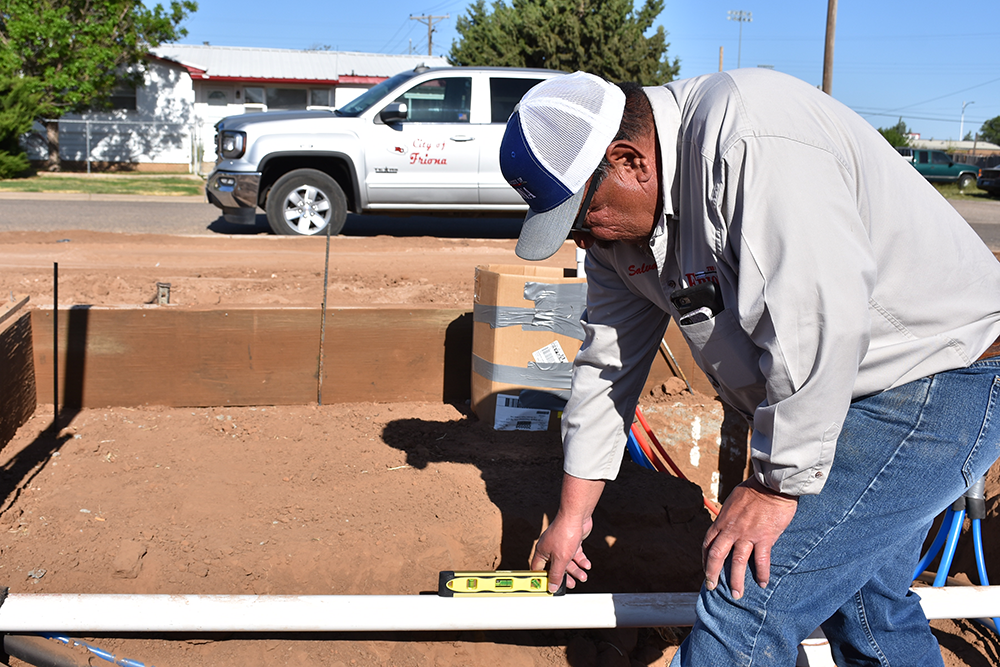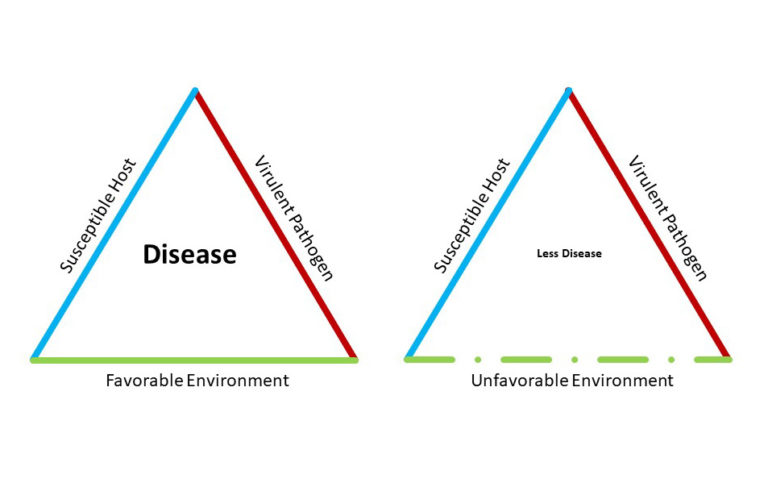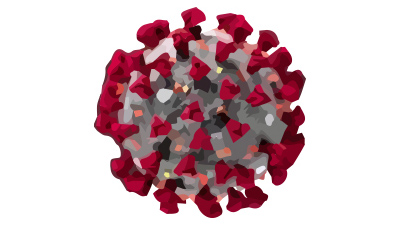

Public Works Director Salvador Garcia inspects work being done in Phase 1 of the new housing project at 6th and Ashland. The new triplex and quadplex residential properties are scheduled to be completed near the end of October.
For many of the dogs rescued by Parmer Paws, the change from competing for food and avoiding predators or abusive humans to living with a foster family is a first step toward a permanent home. They move from danger to safety. The next step to a permanent home may occur quickly—one of the shelters that has adoption facilities could have a space; a new family may soon welcome the dog to their home. For some, however, that next step may be long in coming. The network of people seeking homes for these dogs must often search beyond county and state boundaries to find those homes. In that process of finding their homes, some dogs actually fly.
One of the people in that human network is Brenda Walsh. She partners with groups such as Parmer Paws and provides a unique service. Some think of her as the travel agent for flying dogs. She explained, "I had been volunteering at the Amarillo shelter when I learned of the Pilots and Paws group. They are a national non-profit that links rescue groups with private pilots who volunteer to fly dogs to shelters or foster placements in order to find permanent homes. They combine the flying to accumulate the hours they need to maintain their licenses with helping rescue groups save animals."
According to Walsh, the typical flight for one pilot is 250 miles. But some of the dogs' destinations are farther away, so her work involves making connections and coordinating many "moving parts" in the trip. Destinations have included St. Louis, Kansas, Nebraska, Wisconsin, and Oregon. A recent flight detailed on a Facebook page Walsh maintains for her work, Friends of Texas Panhandle Shelter Pets, https://www.facebook.com/FTxPSP/, involved five dogs, six pilots, and destinations in New Mexico and Wisconsin.
Walsh said that groups like Parmer Paws not only make use of the service she provides, but they also complete the steps vital to preparing the dogs from Parmer Paws to fly.
For example, Parmer Paws volunteers must submit photos and videos of the candidate flyer dogs; they have to vaccinate for parvo and distemper, deworm, and have a vet vaccinate for rabies, provide prescription flea and tick medicine, and a heartworm test. A vet is also necessary to provide the health certificate that allows the animals to fly across state lines. For some, there may be other tests required, and grooming is essential for each dog. All those necessary steps take time and effort on the part of volunteers. And after all that preparation, the volunteers also transport the dogs to the airport, usually in Hereford or Amarillo.
Why does Walsh spend hours at her part of this volunteer work? She said, "Every small job is important. Without volunteers, these animals would suffer." When asked if there was something more she would like to share, she replied, "Spaying or neutering is a big part of responsible pet ownership, and that alone would solve a lot of the problem of abandoned or abused animals."
You can also help by joining Parmer Paws and volunteering. You could be a part of the process of helping a dog fly to a better life in a new home. See the forms page on the Friona Star Website https://www.frionaonline.com/forms



photos of Maisie, a flying dog, ready for her trip.
AUSTIN - On Tuesday, Governor Greg Abbott held a press conference and announced that he will be issuing an Executive Order to expand openings of certain businesses and activities. "Texas is in a position to continue opening parts of our economy because of the efforts and determination of the people of Texas," said Governor Abbott.
The Governor was joined for the press conference by Texas Department of State Health Services (DSHS) Commissioner John Hellerstedt, MD, Texas Division of Emergency Management (TDEM) Chief Nim Kidd, Texas Health and Human Services (HHSC) Acting Executive Commissioner Phil Wilson, TEA Commissioner Mike Morath, and Adjutant General of Texas Maj. Gen. Tracey Norris.
Per the Governor's announcement, wedding venues and services required to conduct weddings may immediately open. Weddings held indoors other than at a church, congregation, or house of worship must limit occupancy to 25%. Wedding reception services may also resume, but facilities must limit their occupancy to 25% of the total listed occupancy. These occupancy limits do not apply to the outdoor areas of a wedding reception or to outdoor wedding receptions.
Beginning May 8, cosmetology salons, hair salons, barber shops, nail salons and shops, and other establishments where licensed cosmetologists or barbers practice their trade, may open, but all such salons, shops, and establishments must ensure at least six feet of social distancing between operating work stations. Tanning salons may also reopen under the same limitation. Also starting May 8, swimming pools may open subject to certain limitations, including on their occupancy or operating levels.
Beginning May 18, office buildings may open with the greater of five or less individuals or 25% of the total office workforce. These individuals must maintain appropriate social distancing. Gyms, exercise facilities, and exercise classes may also open on May 18, but must operate at 25% occupancy. Locker rooms and shower facilities will remain closed, but restrooms may open. Non-essential manufacturing services may also open on May 18 but facilities must limit their occupancy to 25%.
Surge Response Teams
During the press conference, Chief Kidd and Commissioner Wilson provided details on the newly formed Surge Response Teams. Surge Response Teams will serve nursing homes, prisons, packing pants, and other facilities that experience flare ups of COVID-19 by providing personal protective equipment, testing supplies, onsite staffing, and assessment assistance. These teams will also work with local officials to establish health and social distancing standards to contain these flare ups.
Guidelines for Class of 2020 Graduation Ceremonies
TEA Commissioner Morath also provided new guidance on class of 2020 graduation ceremonies for Texas school districts. The TEA is providing four different pathways for schools to celebrate their graduating seniors, and each district is at liberty to determine if any of these options best serve the needs and desires of their community:
• Completely virtual ceremonies that take place entirely online, with the use of videoconference or other technologies.
• Hybrid ceremonies, which consist of a compilation of videos of students being recognized in person as they celebrate graduation in small groups.
• Vehicle ceremonies, in which students and their families wait in their cars while other graduates are recognized one at time with their families alongside them.
• Outdoor in-person ceremonies, which are currently permitted for counties as follows:
• Between May 15 and May 31, an outdoor ceremony may take place in a rural county that has an attestation as
described in the Governor's Report to Open Texas that remains in effect 7 days prior to the ceremony.
• An outdoor ceremony may take place in any Texas county on or after June 1.
Tuesday, May 12, 2020, 11:00 a.m. at Templo Bautista Damasco
Viewing will be from 3:00 p.m. to 9:00 p.m. Monday, May 11, 2020
Wednesday, May 13, 2020, 2:00 p.m. at Ron Smiley Memorial Chapel
***
The warning sirens around town went off "without warning" Wednesday morning just before 8 a.m. There were no warning signs that the warning sirens would start warning people without warning. Too bad the system does not have a snooze button.
***
Prairie Acres Administrator Casey Tiffany would like to thank everyone for their cooperation with the visitor restrictions, donating masks, bringing treats, and giving out sweet words of encouragement. She would like to remind family and friends that they can also use facetime and webcams to stay connected with their loved ones. You are invited to send flowers on Mother's Day if you wish to do so. The Resident of the Month is Jack Dennis. The Employee of the Month is Adriana Alvarez. She works in the Dietary department and has been with Prairie Acres since October 2019.
***
The Friona Cemetery Association announced that the annual clean-up day which was scheduled for Thursday, May 14th has been cancelled due to Covid-19 concerns. Any cleanup by individuals or small groups in the near future would be appreciated.
***
Last Chance!!! The City of Friona is on the lookout for the best-looking face mask. If you think your face mask is a winner, email a picture of yourself sporting it to cityinfo@frionatx.us. The winner of the contest will be announced on Friday, May 8th and receive $100 worth of Friona bucks to be used at local restaurants.
***
National Days
May 7 — Day of Prayer
May 8 — Provider Appreciation Day
May 9 — Train Day
May 10 — Mother's Day
May 11 — Foam Rolling Day
May 12 — Fibromyalgia Awareness Day
May 13 — Apple Pie Day
***
This week the U.S. Secretary of Agriculture Sonny Perdue sent letters to Governors across the nation and leadership of major meat processing companies to establish the U.S. Department of Agriculture's (USDA) clear expectations for the implementation of President Donald J. Trump's Executive Order signed last week. The President's Executive order directs plants to follow the Centers for Disease Control (CDC) and the Occupational Safety and Health Administration (OSHA) guidance specific to the meat processing industry to keep these critical facilities open while maintaining worker safety.
"USDA expects state and local officials to work with these critical meat processing facilities to maintain operational status while protecting the health of their employees," Secretary Perdue said. "Meat processing facilities are critical infrastructure and are essential to the national security of our nation. Keeping these facilities operational is critical to the food supply chain and we expect our partners across the country to work with us on this issue."

Texas Panhandle:
2057 cases, 31 deaths
Armstrong County: 2
Briscoe: 1
Carson: 1
Castro County: 20
Childress: 1
Collingsworth: 1
Cottle: 2
Dallam County: 11
Deaf Smith County: 41
Donley County: 25
Gray County: 71
Hansford County: 12
Hartley County: 6
Hemphill County: 1
Hutchinson County: 21
Lipscomb: 2
Moore County: 448
Ochiltree: 25
Oldham County: 3
Parmer County: 16
Potter County: 971
Randall County: 333
Roberts County: 2
Sherman County: 19
Swisher County: 10
Wheeler County: 12
Eastern New Mexico:
41 cases, 1 death
Curry County: 23
Quay County: 4
Roosevelt County: 11
Union: 3
Oklahoma Panhandle:
283 cases, 3 deaths
Beaver County: 8
Cimarron: 1
Texas County: 274
Texas:
34,422 cases
948 deaths
United States:
1,234,951 cases
72,023 deaths
Worldwide:
3,655,959 cases 256,934 deaths
County Disaster Declaration (English)
March 16 FISD Letter (English) (Spanish)
March 31 FISD Letter (English) (Spanish)
Letter from City Manager (English) (Spanish)
Friona Community Helpline (English)
2-1-1 Texas Social Services Hotline (English)
Share The Facts about COVID-19 (English) (Spanish)
What You Need To Know (English) (Spanish)
What To Do If You Are Sick (English) (Spanish)
County Clerk PSA (English)
Chamber of Commerce Letter to Businesses (English)
Friona Interbank Lobby Closed (English)
FISD Emergency Resolution (English)
Lessons from the plant world offer insight into COVID-19 pandemic
Written by Kay Ledbetter, 806-677-5608, skledbetter@ag.tamu.edu
Plants are no strangers to diseases and devastating outbreaks. Humans can learn a valuable lesson from them when it comes to the current COVID-19 pandemic, according to a Texas A&M professor.
While the urge is to return to our workplace and business once diagnosed COVID-19 cases peak, a Texas A&M AgriLife Research virologist and plant pathologist says one must only turn to the plant world to see how that would be a mistake. "When we reach the peak, we are at best only halfway towards coming down from this mountain of disease," said Karen-Beth Scholthof, Ph.D., a professor in the Department of Plant Pathology and Microbiology at Texas A&M University.
Scholthof concurs with Dr. Anthony Fauci, director of the National Institute of Allergy and Infectious Diseases, that social distancing should continue until there are essentially no new cases, no deaths.
Her reasoning is based on a long-standing concept from plant pathology, which she says describes the spread of any disease, explains why environmental measures matter, and sheds light on the similarities between plant and human diseases.
"All biology is connected. Now is the time to learn from other areas of science and the environment," said Patrick J. Stover, vice chancellor of Texas A&M AgriLife, dean of the College of Agriculture and Life Sciences and director of AgriLife Research. "We may need to take extra time now, which we know will be difficult in the short-term, but life-saving for many in the long-term.
"The novel coronavirus is certainly revealing our vulnerabilities, from the food supply system to our social environments to the quality of life. We must learn from this experience, including prioritizing the development of cutting-edge technologies to protect from and prevent against COVID-19 and its far-reaching effects on our lives before we restart the vicious cycle once again, especially the most vulnerable."

The disease triangle
Disease outbreaks depend on the "disease triangle," Scholthof said. This concept arose more than 60 years ago when George McNew, a plant pathologist at the Boyce Thompson Institute for Plant Research, diagrammed the fact that an epidemic arises from the interaction of three factors – a susceptible host, a virulent pathogen and a hospitable environment.
Scholthof said a simple form of McNew's disease triangle is helpful to explain the key role of environment in the success of pathogens such as SARS-CoV-2, the virus that causes COVID-19.
Genetically identical plants are a "monoculture" and are especially vulnerable to emerging pathogens and disease. Today, plant pathologists break these cycles of disease by modifying or controlling either the host, the pathogen or the environment.
"We may breed crops that are resistant to the disease, plant them in a different way or at different times or use chemical treatments to protect the plants from harmful fungi, viruses, bacteria and insects," Scholthof explained. "By changing the host with resistance genes, stopping the pathogen with chemicals, or altering the environment by planting earlier or later, for example, we can control an outbreak of a new disease or seasonal recurrence of a known pathogen." In the case of COVID-19, people are the susceptible hosts and SARS-COV-2, the virulent pathogen. The constant and close contact between people is the hospitable environment needed to keep this pandemic going strong. The novel coronavirus, having jumped from an animal host, has become extraordinarily successful at infecting humans.
"We do not have population-wide immunity to this virus," Scholthof said. "Again, from Dr. Fauci, we 'don't make the timeline, the virus makes the timeline.' Until drugs or vaccines are shown to control the virus and the disease, we can only do our part to disrupt an environment that is favorable to the novel coronavirus."
Taking a page out of plant pathology history
She used the Great Irish Potato Famine, a humanitarian crisis, to shed light on the close link between pathogens, the environment and society — including how an epidemic drives policy while unmasking social and economic injustice.
"These are issues that strike close to home since COVID-19 has become our daily reality," Scholthof said.
The Irish potato famine was precipitated by late blight disease of potato, which still occurs today. First-hand reports from Ireland described how the blight sprung up overnight with fields of lush green plants suddenly destroyed, resulting the near total collapse of the potato crop.
Although disease outbreaks were also occurring in Europe and North America, the dependence of the Irish poor on the potato for most of their food calories was devastating. This plant disease outbreak led to the emigration of a million people from Ireland and another million deaths — a loss of 25% of the country's population.
"It was a single pathogen that provided a horrifying lesson for the need to scientifically manage, reduce and control disease," Scholthof said. "COVID-19 will recur if we do not continue to perturb the virus's favored environment until either a vaccine to strengthen the host or medications to destroy the virus are created."

Controlling the outbreak
There may be a single peak of infection, waves of infection, or seasonal recurrence of COVID-19 in our communities, Scholthof said. Similarly, potato late blight disease that caused such destruction is ongoing today, but in a controlled environment.
"Ongoing COVID-19 infections would suggest that we have not been sufficiently vigilant with perturbing the virus's favored environment," she said. "Today, and for at least the near future, disrupting a favorable environment for the virus is the main element of controlling the spread of the disease, and the disruption must continue until either proven vaccines or medications are created."
Social distancing and good hygienic practices remain the best community options available to break the disease triangle, Scholthof said. Simple efforts such as handwashing disrupt the virus's membrane envelope, preventing it from initiating an infection.
"With time, we, the host, may acquire 'herd immunity' as a form of protection from the virus," she said. "Or the amazing ongoing scientific work may identify safe and effective treatments or a vaccine.
"But we must remain vigilant in continuing with the recommended practices that create an unfavorable environment for the virus until that time occurs," Scholthof said. "We must not become complacent."